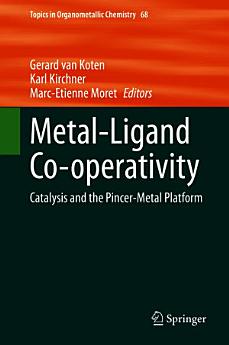Metal-Ligand Co-operativity: Catalysis and the Pincer-Metal Platform
Gerard van Koten · Karl Kirchner · Marc-Etienne Moret
Mar 2021 · Topics in Organometallic Chemistry Book 68 · Springer Nature
Ebook
451
Pages
reportRatings and reviews aren’t verified Learn More
About this ebook
This book provides researchers in the fields of organic chemistry, organometallic chemistry and homogeneous catalysis with an overview of significant recent developments in the area of metal-ligand cooperativity, with a focus on pincer architectures. The various contributions highlight the widespread impact of M–L co-operativity phenomena on modern organometallic chemistry and catalyst development. The development of efficient and selective catalytic transformations relies on the understanding and fine control of the various elementary reactions that constitutes a catalytic cycle. Co-operative ligands, which actively participate in bond making and bond breaking together to the metal they support, open up new avenues in this area. In particular, buttressing a weak or reactive metal-ligand bond by flanking coordinating arms in a pincer ligand design is proving a versatile strategy to access robust metal complexes that exhibit unusual and selective reactivity patterns.
About the author
Gerard van Koten is emeritus distinguished professor at Utrecht University. He has been involved in the early development of organometallics with the pincer platform with the NCN-bonding motive (first 1976), PCP and SCS. He explored their use as homogeneous catalysts either as such or immobilized on dendrimers (1994) or covalently attached to enzymes (2005), as sensoring materials (SO2 (2000) or I2 (1986)), and as photoactive materials (2000). Particular interest has been directed to study (reversible) C-C bond formation and bond cleavage (1978) processes on the pincer-metal platform.
Karl Kirchner is presently Professor of Organometallic Chemistry at the Technical University of Vienna (TU Wien). His expertise is centered around the theme ligand design, synthesis of well-defined non-precious transition metal complexes and their applications in homogeneous catalysis. He obtained his PhD in 1987 from TU Wien with Prof. R. Schmid. After two postdoctoralstays at Washington State University with Prof. J. P. Hunt (1988, 1989) and Nobel laurate Prof. H. Taube at Stanford University (1990), he returned to TU Wien completing his Habilitation in 1994.
Marc-Etienne Moret obtained a PhD degree from the Eidgenössische Technische Hochschule Zürich (ETHZ) with Prof. P. Chen in 2009. In 2010, he moved to the California Institute of Technology (Caltech) for postdoctoral research in the group of Prof. J. C. Peters on the activation of N2 by synthetic iron complexes. Since 2012, he is assistant professor in the group of Organic Chemistry and Catalysis at Utrecht University (UU). His research interests revolve around the design of novel ligands for small-molecule activation and catalysis using first-row transition metals.
Karl Kirchner is presently Professor of Organometallic Chemistry at the Technical University of Vienna (TU Wien). His expertise is centered around the theme ligand design, synthesis of well-defined non-precious transition metal complexes and their applications in homogeneous catalysis. He obtained his PhD in 1987 from TU Wien with Prof. R. Schmid. After two postdoctoralstays at Washington State University with Prof. J. P. Hunt (1988, 1989) and Nobel laurate Prof. H. Taube at Stanford University (1990), he returned to TU Wien completing his Habilitation in 1994.
Marc-Etienne Moret obtained a PhD degree from the Eidgenössische Technische Hochschule Zürich (ETHZ) with Prof. P. Chen in 2009. In 2010, he moved to the California Institute of Technology (Caltech) for postdoctoral research in the group of Prof. J. C. Peters on the activation of N2 by synthetic iron complexes. Since 2012, he is assistant professor in the group of Organic Chemistry and Catalysis at Utrecht University (UU). His research interests revolve around the design of novel ligands for small-molecule activation and catalysis using first-row transition metals.
Rate this ebook
Tell us what you think.
Reading information
Smartphones and tablets
Install the Google Play Books app for Android and iPad/iPhone. It syncs automatically with your account and allows you to read online or offline wherever you are.
Laptops and computers
You can listen to audiobooks purchased on Google Play using your computer's web browser.
eReaders and other devices
To read on e-ink devices like Kobo eReaders, you'll need to download a file and transfer it to your device. Follow the detailed Help Center instructions to transfer the files to supported eReaders.







